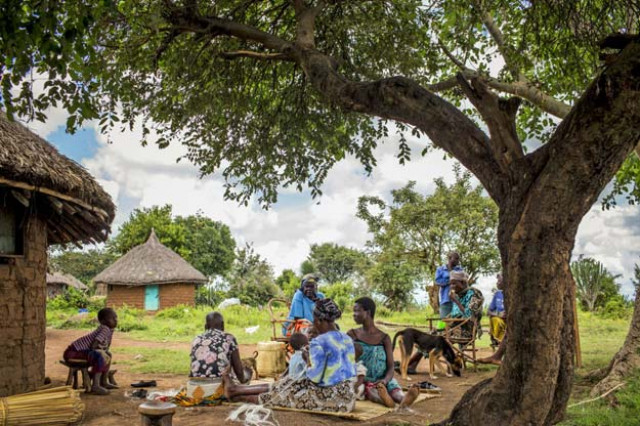Why straight women are marrying each other in Tanzania
Practice allows women to marry each other to preserve their livelihoods in the absence of husbands

Mugosi Isombe (seated on mat, in blue) and Paulina Mukosa (seated on mat, in teal) eat lunch with family and other friends PHOTO: Charlie Shoemaker
Mugosi Maningo and Anastasia Juma, who own a homestead in the remote village of Nyamongo, are married under a local tradition called nyumba ntobhu meaning house of women. "My wife and I do everything together," says 27-year-old Juma. "We're just like any married couple."
Can transgender marry? ‘Yes,’ says new Fatwa
The practice allows women to marry each other to preserve their livelihoods in the absence of husbands. Female couples make up 10 to 15 per cent of households, according to Kurya elders. The unions involve women living, cooking, working, and raising children together, even sharing a bed, but they don't have sex.
 Isombe, Veronica Nyagochera, and Mukosa pose for a family portrait outside their home PHOTO: Charlie Shoemaker
Isombe, Veronica Nyagochera, and Mukosa pose for a family portrait outside their home PHOTO: Charlie ShoemakerAccording to Dinna Maningo, a reporter, nobody knows when the practice started. “But its main purpose is to enable widows to keep their property."
Although Kurya tribal law dictates that only men can inherit property, under nyumba ntobhu if a woman without sons is widowed or her husband leaves her, she is allowed to marry a younger woman who can take a male lover and give birth to heirs on her behalf. However, the custom is very different from same-sex marriages in the West because homosexuality is strictly forbidden. "Most Kurya people don't even know gay sex exists in other parts of the world," Dinna adds. "Especially between women."
However, the old tradition is getting a modern makeover. Kurya has a patriarchal society where men are allowed to marry multiple wives in exchange for cows. As such, younger women are choosing to marry another woman as it gives them more freedom. "They realise the arrangement gives them more power and freedom. It combines all the benefits of a stable home with the ability to choose their own male sexual partners," Dinna says. Marriages between women also help to reduce the risk of domestic abuse, child marriage, and female genital mutilation.
Colombia legalizes same-sex marriage
Almost all Kurya marriages, whether to a man or a woman, involve the payment of bride price, or dowry, to the younger woman's family. Dowries average between 10 and 20 cows (one cow is worth around 500,000 Tanzanian shillings, or about $230), and teen girls are typically married off to the highest male bidder.
However, Nyumba ntobhu marriages are not recognised in Tanzanian law, so any man who fathers the children must agree to honour tradition and give up all paternal rights.
Marriages between women are accepted by tribal leaders because they serve a number of functions within the tribe. "They solve the problem of what to do about widows. A widow gets to keep her property, and she does not become a burden when she gets old. No man wants to marry a woman who can no longer bear him children," says chief tribal elder is Elias Maganya.
This article originally appeared on Marie Claire.



















COMMENTS
Comments are moderated and generally will be posted if they are on-topic and not abusive.
For more information, please see our Comments FAQ